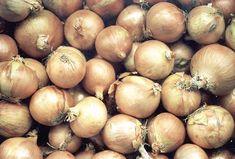
According to the British Onion Producers' Association, ideal conditions at harvest have allowed growers to lift their crops at optimum dates. However, the association warns that bulb size is smaller than optimum this season and yields are lower than they had budgeted for. Overall bulb size is down on average and instead of 60-70 per cent of the crop falling within the 65-90mm range, BOPA reports that "very little" of the crop will be over 75mm in size. "And probably 50-60 per cent of the crop this year is 60-75mm," said David Hodgson, the association's chairman.
He estimates that total marketable tonnage is around 356,000 tonnes of brown onions and 41,000t of red onions. "This would suggest that the UK crop is in balance against the usual marketed demand," said Hodgson. Last season the brown onion crop reached 407,000t and in 2001 was 322,000t.
Prices so far this season are strong as they are also affected by crop availability on the Continent. "The severe drought in eastern Europe has resulted in much earlier demand from the Netherlands for onions and even this year from the UK," explained Hodgson. "Prices at this time are significantly higher than normal as a result of this demand."
Onion volumes are sufficient to meet supermarket programmes, but retailers are likely to have to review size specifications and take 60mm as the smallest size for loose product.
While growers, might be delighted by strong prices, processors will be doubly hard hit. They are likely to find it hard to achieve adequate volumes of their preferred 60mm-plus size for peeling. Using smaller sizes reduces throughput and increases wastage and in a high-price year, will have a further knock-on effect on commercial viability.
BOPA is also warning against new producers coming into the marketplace. "Our grower member ship needs to have a successful and profitable year after four or five very unprofitable ones," said Hodgson. "Acreages are at a sustainable level year on year. An increase for the future with more normal yields will already result in an over-production situation. Producers unfortunately tend to have short memories. Last year a predicted shortage encouraged growers to hold onto stocks very late in the season and the market then collapsed.
"Planned and sensible marketing must be the route to success, a profitable season and a sustainable future."



